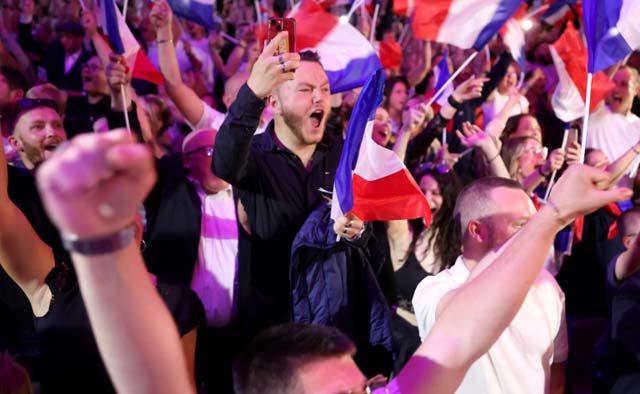
PARIS, July 6, 2024 (BSS/AFP) - France's tense election campaign was on hold Saturday on the eve of the final vote, but thoughts were turning to an uncertain future before polling even opens.
The traditional final day pause ahead of Sunday's second round runoff will do nothing to soothe fears of stalemate and stagnation in France, a world power and pillar of the EU.
Final opinion polls Friday suggested that far-right leader Marine Le Pen's National Rally (RN) would fall short of winning an outright majority in the National Assembly.
But President Emmanuel Macron's gamble in calling snap elections to force a choice between his centrist path and the extremes of left and right has not paid off.
He now faces the final three years of his presidency with no clear ruling majority, and Prime Minister Gabriel Attal perhaps trying to hold together a caretaker government.
According to pollsters Ipsos and Ifop, anti-immigrant, eurosceptic RN could secure 170 to 210 seats in the National Assembly -- well short of 289, an absolute majority.
The Ipsos Talan poll for Le Monde, Radio France and France Televisions has the RN coming in just ahead of left-wing alliance the New Popular Front, on between 145 and 175 seats.
- Outright win? -
Both the far-right and left-wing groups come in well ahead of an estimated 118 to 148 for Macron's centrist allies, who held 250 seats in the outgoing parliament.
French voters could therefore go to bed on Sunday night with no idea who might be able to form and lead a government, or whether a weakened Attal will shoulder on.
Le Pen insists that she is still on course for victory and an absolute majority that would force Macron to appoint her 28-year-old lieutenant Jordan Bardella prime minister.
"Either the RN wins an absolute majority and I can, from Sunday, embark on my project to rebuild ... or the country is blocked," Bardella warned on Thursday.
Attal, for his part, has vowed to stay on "as long as necessary" in a caretaker role, while Macron's office is studying options to maintain some form of government.
Macron is to remain in office until presidential and legislative elections in April 2027, but he must now face the possibility of sharing power with political foes.
The prospect of France forming its first far-right government since World War II has dismayed its European allies, already perplexed by Macron's wild gamble on a snap poll.
And even if the RN falls short, as polling firms now predict, France will be heading into unknown political waters as Paris prepares to host the Olympic Games.
In an effort to halt the far-right rise seen in the first round of voting on June 30, centrists and left-wing parties have formed second round polling pacts.
Le Pen has denounced the move as a bid to steal victory "against the will of the people" by creating what she calls a "single party" to protect the political class.
But it is far from certain how many voters who saw their preferred candidates drop out to give another a clear run against the RN will bother to turn out on Sunday.
- Fears of violence -
Janine Mossuz-Lavau, emeritus director at the Cevipof institute, told AFP: "With the withdrawals, the person for whom voters were intending to vote has fallen by the wayside.
"Some are going to say to themselves: 'No, in these conditions, it's not possible'."
With so much of the outcome uncertain, tensions are rising.
More than 50 candidates and campaign activists have been physically assaulted during the four-week campaign, the shortest in modern French history.
About 30,000 police will be deployed this weekend to head off trouble.
French stocks held steady Friday with investors expecting the far right to fail to win an absolute majority.
But analysts predict a turbulence if the RN tries to implement its costly economic programme, which includes reversing Macron's hard-won pension reforms.